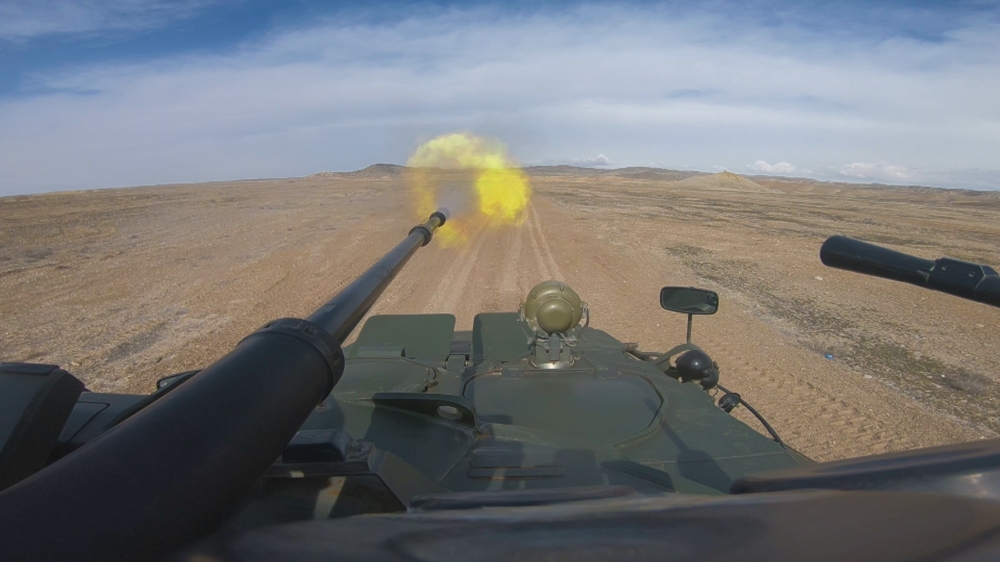The Armed Forces of Azerbaijan are scheduled to begin massive military drills between March 15 and 18, which will involve thousands of troops from various forces and hundreds of military equipment.
The country’s Defense Ministry announced that the Army Corps, Rocket and Artillery Troops, Air Force, and Special Forces of the national army will take part in the operational-tactical exercises.
“The exercises that will be held under the leadership of the Minister of Defense involve up to 10,000 military personnel, up to 100 tanks and other armored vehicles, up to 200 missiles and artillery systems of various caliber, multiple launch rocket systems, and mortars, up to 30 military aviation assets, as well as unmanned aerial vehicles for various purposes,” the ministry’s statement read.
The main focus of drills is to improve control of troops, rehearsals for combat readiness and regrouping, as well as combat coordination and interoperability between the troops.
The massive drills will be the first to be held by Azerbaijani forces within the national borders following the country's war with Armenia in the Karabakh region last year. In January, the Azerbaijani forces attended joint exercises, dubbed “winter exercise,” with the Turkish forces. Moreover, separate units of the Azerbaijani army such as the mortar batteries, Air Force, and tank units completed separate drills following the war. The upcoming drills will reportedly deploy the combat experience gained during the last year’s full-blown war.
The Azerbaijani forces went through an all-out war with the military of Armenia in the Karabakh region over 44 days from September 27 through November 9 of last year. Following the outbreak of hostilities started by Armenian forces deployed in the occupied Azerbaijani lands, Azerbaijani troops launched counter-attack operations, codenamed “Iron Fist,” for pushing back the offensive, and managed to liberate the internationally recognized Azerbaijani lands from Armenia’s illegal occupation.
The war ended in a tripartite ceasefire statement signed on November 10 by Armenia, Azerbaijan, and Russia. By the end of clashes, Azerbaijani forces retook control of over 300 settlements, including five major cities in the Karabakh region, the historically and internationally recognized territory of Azerbaijan. Armenia returned the once occupied Aghdam, Kalbajar, and Lachin districts to Azerbaijan in non-combat conditions set by the ceasefire document.
The ceasefire period saw consecutive attacks by armed Armenian subversion groups trying to infiltrate the Azerbaijani positions in the liberated lands. Four Azerbaijani servicemen and a civilian have been martyred in such attacks. Azerbaijan's government has called such attempts terrorist attacks, adding that those responsible should be held accountable.
The task list of the forthcoming drills of the Azerbaijani forces reportedly includes the fight against terrorist detachments, in particular, illegal armed formations, and counter-terrorism operations.
In the Global Firepower rankings, Azerbaijan is marked as the world’s 64th strongest and the strongest military in the South Caucasus region ahead of its neighbors Georgia and Armenia who rank 92 and 100 respectively.







 The number of evacuees from flooded areas in Kazakhstan has reached 97,852 people, including about 32,856 children since March 27.
The number of evacuees from flooded areas in Kazakhstan has reached 97,852 people, including about 32,856 children since March 27.
 The Islamic holy month of fasting, Ramadan comes to an end this week with the celebration of a joyous festival called Eid (meaning “festival” in Ar...
The Islamic holy month of fasting, Ramadan comes to an end this week with the celebration of a joyous festival called Eid (meaning “festival” in Ar...
 Iran's senior military leaders described the drone and missile attack on Israel on April 14 night as “successful".
Iran's senior military leaders described the drone and missile attack on Israel on April 14 night as “successful".
 Iranian President Ebrahim Raisi warned Israel that it would face a "real and extensive" response if it makes any "mistake" following Tehran’s missi...
Iranian President Ebrahim Raisi warned Israel that it would face a "real and extensive" response if it makes any "mistake" following Tehran’s missi...



